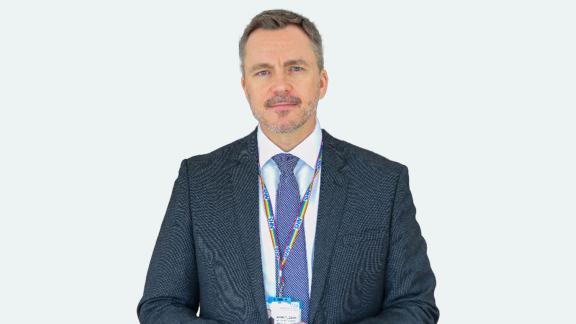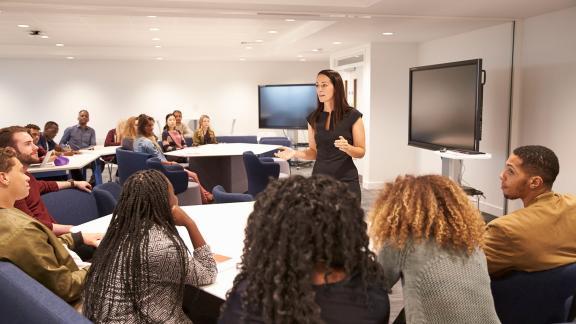Meaningful change is needed to improve LGBTQ+ staff experience

LGBTQ+ healthcare staff are continuing to experience greater levels of bullying and harassment in the workplace. As leaders we need to do more to ensure that the NHS is truly inclusive, writes Mark Cubbon.
We know how vital it is for healthcare leaders to create working environments where their staff feel included, supported and can thrive in their roles. Yet the findings from successive NHS Staff Surveys show slow progress, with LGBTQ+ staff continuing to have significantly poorer experiences at work than their colleagues.
The Health and Care LGBTQ+ Leaders Network - which I am proud to chair - wanted to delve deeper into these findings to explore why this is, and what we can do to change it.
In August 2024 we carried out a survey of our 2,000 network members, comprising LGBTQ+ leaders, aspiring leaders and allies, to explore the realities of LGBTQ+ staff experience in the NHS and benchmark any progress made with organisational inclusion. Over 540 members responded, with 78 per cent identifying as LGBTQ+ and the remaining 22 per cent responding as allies. We were incredibly grateful to them for sharing their experiences with us.
Testimonials and stories
I must admit, I was deeply saddened by some aspects of the survey results and believe they provide an opportunity for us all to pause and reflect. While many of our members highlighted great work taking place to embed LGBTQ+ inclusion, others shared tangible frustration. 39 per cent of respondents believe their organisations have implemented meaningful inclusion work but, significantly, 37 per cent believe their organisations have not.
The testimonials and stories about the realities of their experience in the workplace as LGBTQ+ staff and allies were encouraging and inspiring, but also sad and frustrating. On average, our members disclosed higher rates of direct or indirect homophobia and transphobia, compared to the NHS Staff Survey results. A huge 25 per cent had experienced homophobia and 20 per cent experienced transphobia.
Sobering results
What stood out for me was that only 14 per cent of respondents felt that their organisations acted swiftly and appropriately to instances of discrimination, bullying and harassment. This is a sobering result. And with one-in-20 NHS staff identifying as LGBTQ+, we need to come together to take meaningful action and ensure our staff feel confident that their concerns are taken seriously.
"If we want to drive inclusion and diversity in our organisations, we must continue to prioritise the diversity of our leadership"
Another challenge we continue to face is the diversity of leadership itself. When we benchmarked our findings against our 2021 survey, the message was clear: organisations’ leadership still does not reflect the diversity of their workforce. It is crucial that our leaders have a personal understanding of how workplaces can be difficult to navigate when you have one or more protected characteristics. If we want to drive inclusion and diversity in our organisations, we must continue to prioritise the diversity of our leadership.
We all know that creating a safe environment for our staff, which provides a sense of belonging and encourages active allyship, is not a nice to have - it is essential. Our Health and Care LGBTQ+ Inclusion Framework offers practical support so we as leaders can make improvements and create inclusive environments for LGBTQ+ staff and service users. But, this is a complex challenge that needs action from multiple fronts. Alongside belonging and inclusion strategies, our ask to all leaders is to ensure that their organisation has robust anti-discrimination policies, accessible avenues to raise complaints, and clear communication processes once those complaints have been addressed. We know that strategies like these have contributed to both improved staff survey scores and workforce retention.
"...we have an individual and collective role as leaders to listen to our LGBTQ+ staff and act to create inclusive, supportive cultures in the workplace"
This is one of the greatest leadership challenges we face and I know within my own organisation, despite the positive improvements we have made in a number of areas, there is still a lot of work to do to. Clearly, we have an individual and collective role as leaders to listen to our LGBTQ+ staff and act to create inclusive, supportive cultures in the workplace, with robust policies and processes, where everyone feels safe and able to fully be themselves.
It is important to recognise too the work still to be done to improve staff experience across a number of protected characteristics. We know for example that BAME colleagues continue to face barriers to senior leadership roles despite making up over a quarter of our workforce. Directly addressing the challenges that have been raised by our LGBTQ+ workforce will inevitably improve working conditions, and ultimately patient experience, for all of our staff.
Inclusivity is more than just policy, it is also about action and impact. The Health and Care LGBTQ+ Leaders Network is looking at further ways that we can advocate and support our members and leaders across the NHS. I will not deny that there are challenges ahead, but our members have spoken. So, as leaders, let us listen, reflect and take robust action to reduce these inequalities and ensure that our LGBTQ+ staff are able to feel safe and can thrive at work.
Mark Cubbon is chief executive officer at Manchester University NHS Foundation Trust and chair of the Health and Care LGBTQ+ Leaders Network. You can follow Mark on LinkedIn.



